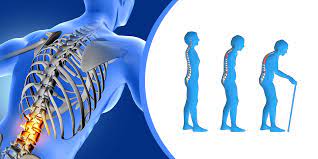What is
Osteoporosis
Osteoporosis is the thinning of bone and by itself is not painful. It is generally associated with aging. Metabolic imbalance, genetics and medications are also factors. Osteopenia is a lesser form of this condition and, if not treated, may progress to the more serious osteoporosis. In the spine, the thoracic and lumbar segments are the most commonly affected. Vertebral compression fractures occur when the bone weakens and can no longer support the load imposed upon it. Spinal symptoms related to osteoporosis include back pain and deformity that can lead to a hunched back and/or decreased height. Compression fractures in osteoporotic vertebrae can be very painful.
What are the Symptoms of Osteoporosis?
Osteoporosis is not painful by itself. However, it may lead to spinal fractures that can cause back pain. The fractures may also result in spinal deformity that can lead to a hunched back and/or decreased height.

How do you Screen and Diagnose Osteoporosis?

After an examination, your physician may take X-rays of the spine to check for fractures. There are several quick-and-easy screening evaluations for osteoporosis that scan the wrist or heel. However, one of the more reliable tests is called dual-energy X-ray absorptiometry (DEXA). A DEXA scan is painless and convenient, and it exposes the patient to very little radiation. Generally, the lower spine and hip are scanned to diagnose osteoporosis. Your bone quality is reported by comparing you to others of the same age and gender as well as to a young adult population. The results are usually considered in terms of your bone being of normal density, somewhat reduced density (called osteopenia) or significantly reduced density (osteoporosis).
Treatments of osteoporosis include supplementation with calcium and Vitamin D. Weight-bearing exercise, including walking, is extremely important to build stronger bones. Certain medications such as bisphosphonates, reloxifene, and parathyroid hormone are available to prevent, reduce or treat osteoporosis. Other medications may be used if the osteoporosis is determined to be related to a more general medical condition. It is important to discuss treatment options with your doctor in deciding which treatment, if any, may be best for you.
What are the Treatments for Osteoporosis?

Request An APPOITMENT
Fell free to contact us with any questions or concern regarding Back/Neck pain.